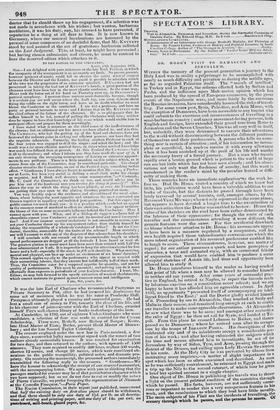It was the late Earl of Chatham who recommended Prettyman
as Private Secretary to Pitt, after he had incurred his displeasure for some act of meanness whilst he was his tutor at Pembroke Hall. Prettyman ultimately played a cunning and successful game. He bad lent a small sum of money to Pitt, towards the close of his life, and in his character of joint-executor with the Earl of Chatham, awarded himself Pitt's well-chosen library of books in discharge of the loan.
At Cambridge, in 1792, out of eighteen Under-Graduates who were candidates, a selection of four was made to contend for the Craven Scholarship. These were, Bethel!, now Bishop of Bangor; Keate, late Head Master of Eton ; Butler, present Head Master of Shrews- bury ; and the late Samuel Taylor Coleridge.
The censors employed under the new law in Paris received, a few days since, a somewhat bulky manuscript signed with the names of two authors already successfully known. It was retained for examination for two days, and then returned to the authors, with upwards of 1500 erasures. They were required to modify 300 lines, replace 500 words, shorten 12 scenes, and change 20 names, which were considered ob- noxious to the public tranquillity, political order, and dramatic pro- priety. On receiving the manuscript, the presumed authors immediately transmitted the following reply to the censors. " Gentlemen—We have the honour to acknowledge the receipt of our censured manuscript, with the accompanying letter. We agree with you in thinking that the passages marked for erasure may be of that perturbative character which you have supposed ; but as we do not dare to cut or modify the verses of Pierre Corneille, we prefer foregoing the representation of Nicomede at the Comedie Francaise."—Paris Paper. The Excise Commission, in their report just published, recommend that half the existing duty on first-class paper should be withdrawn, and that there should be only one duty of lid, per lb. on all descrip- tions of writing and printing.paper, and one duty of 14s. per cwt. on pasteboard, mill-board, glazed paper, &c.


























 Previous page
Previous page